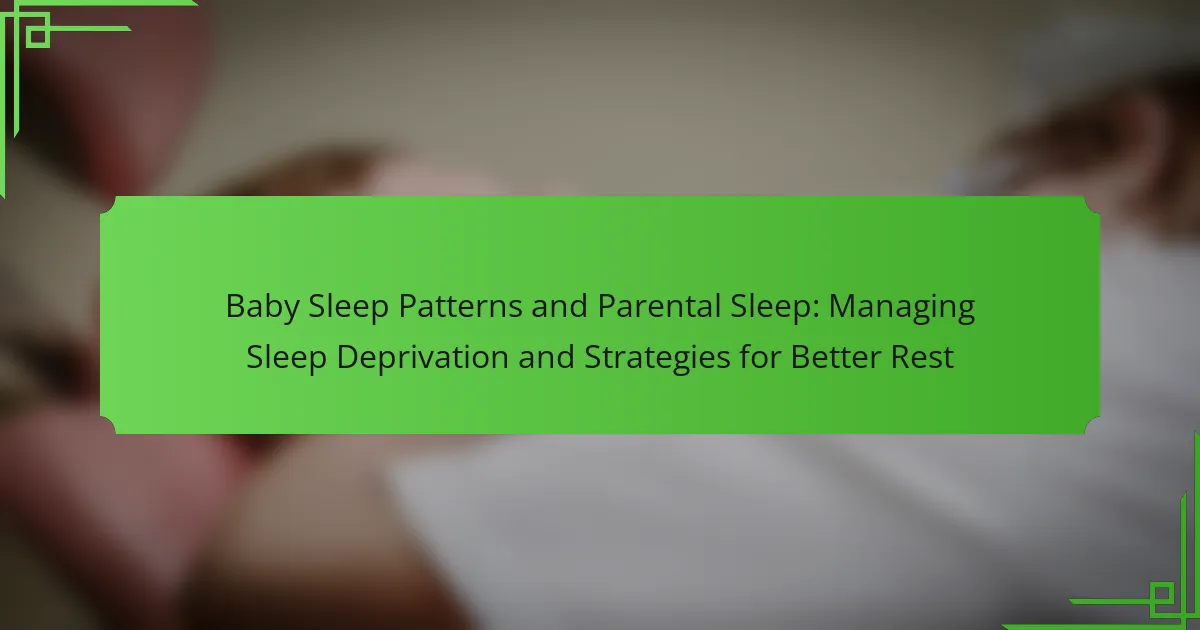Baby sleep patterns encompass the typical sleep behaviors and cycles of infants, who generally sleep 16 to 18 hours daily in short intervals. Newborns experience shorter sleep cycles, predominantly in REM sleep, which is vital for brain growth. As infants mature, their sleep consolidates, allowing for longer nighttime stretches by around 6 months. Parental sleep deprivation often results from the demands of caring for an infant, with parents losing an average of 400 to 700 hours of sleep in the first year. Establishing consistent bedtime routines, creating a conducive sleep environment, and sharing nighttime duties are effective strategies to enhance sleep quality for both babies and parents.

What are Baby Sleep Patterns?
Baby sleep patterns refer to the typical sleep behaviors and cycles observed in infants. Newborns sleep approximately 16 to 18 hours a day, often in short bursts of 2 to 4 hours. Sleep cycles in babies are shorter than in adults, lasting about 50 to 60 minutes. Infants spend a significant amount of time in REM sleep, which is crucial for brain development. As babies grow, their sleep patterns start to consolidate, leading to longer periods of nighttime sleep. By around 6 months, many infants can sleep for longer stretches, often 6 to 8 hours at a time. Understanding these patterns helps parents manage sleep deprivation effectively. Research indicates that consistent sleep routines can improve overall sleep quality for both babies and parents.
How do Baby Sleep Patterns develop over time?
Baby sleep patterns develop through distinct phases as infants grow. Newborns typically sleep 14 to 17 hours daily in short cycles of 2 to 4 hours. This is due to their small stomachs and need for frequent feeding. As babies reach 3 to 4 months, they begin to consolidate sleep into longer stretches at night. By this age, many can sleep 6 to 8 hours at a time.
Around 6 months, babies often establish more regular sleep patterns. They may take 2 to 3 naps during the day, while nighttime sleep increases to about 10 to 12 hours. By the age of 1, most infants will have a predictable sleep schedule with fewer naps.
Sleep patterns continue to evolve as children grow. Toddlers typically require 12 to 14 hours of sleep, including one nap. By age 3, many children transition to nighttime sleep only, averaging 10 to 13 hours. This progression is influenced by developmental milestones and individual differences.
Research indicates that consistent sleep routines help reinforce these patterns. Studies show that infants with regular bedtimes experience better sleep quality. The American Academy of Pediatrics emphasizes the importance of establishing a calming bedtime routine to support healthy sleep development.
What are the stages of sleep for babies?
Babies experience four stages of sleep: NREM Stage 1, NREM Stage 2, NREM Stage 3, and REM sleep. NREM Stage 1 is a light sleep where babies drift in and out of sleep. This stage lasts only a few minutes. NREM Stage 2 is a deeper sleep, making up about 50% of a baby’s sleep cycle. During this stage, heart rate slows, and body temperature decreases. NREM Stage 3 is the deepest sleep stage, essential for growth and development. This stage is crucial for physical restoration. REM sleep is when dreaming occurs and is important for brain development. Babies spend a significant portion of their sleep in REM sleep. Understanding these stages helps caregivers support healthy sleep patterns in infants.
How do age and developmental milestones affect sleep patterns?
Age and developmental milestones significantly influence sleep patterns in infants and children. Newborns typically sleep 14 to 17 hours a day, with sleep cycles lasting about 50 to 60 minutes. As infants grow, their sleep needs decrease. By six months, many infants sleep around 12 to 15 hours, often consolidating sleep into longer stretches at night. Developmental milestones, such as crawling or walking, can disrupt sleep due to increased excitement and activity levels. Research indicates that sleep disturbances often coincide with these milestones. For example, a study published in the Journal of Clinical Sleep Medicine found that sleep patterns can change significantly during periods of rapid development, impacting overall sleep quality.
Why are Baby Sleep Patterns important for development?
Baby sleep patterns are crucial for development because they influence physical growth and cognitive function. During sleep, babies experience rapid eye movement (REM) sleep, which is essential for brain development. Studies show that adequate sleep supports memory consolidation and learning abilities. Furthermore, consistent sleep patterns help regulate a baby’s circadian rhythm, promoting overall health. Sleep deprivation in infants can lead to behavioral issues and hinder emotional regulation. Research indicates that infants who sleep well tend to have better developmental outcomes in later stages. Thus, monitoring and supporting healthy sleep patterns is vital for optimal development.
What role does sleep play in a baby’s growth and health?
Sleep is crucial for a baby’s growth and health. During sleep, babies experience rapid growth and development. Sleep supports brain development, memory consolidation, and learning. It also aids in physical growth by promoting the release of growth hormones. Babies require 14 to 17 hours of sleep daily for optimal health. Insufficient sleep can lead to developmental delays and health issues. Studies show that well-rested babies exhibit better cognitive and emotional regulation. Adequate sleep also strengthens the immune system, helping babies fight infections.
How do sleep patterns influence a baby’s mood and behavior?
Sleep patterns significantly influence a baby’s mood and behavior. Consistent sleep schedules help regulate a baby’s circadian rhythms. When babies receive adequate sleep, they tend to be more alert and engaged. Conversely, irregular sleep can lead to irritability and fussiness. Research indicates that sleep-deprived infants exhibit increased difficulty in emotional regulation. A study by Mindell et al. (2015) found that poor sleep quality is linked to behavioral problems in young children. Therefore, establishing healthy sleep patterns is crucial for optimal mood and behavior in infants.

How does Parental Sleep Deprivation occur?
Parental sleep deprivation occurs primarily due to the demands of caring for an infant. Newborns often wake multiple times during the night for feeding, diaper changes, or comfort. This interrupts the parents’ sleep cycles, leading to fragmented and insufficient sleep. Additionally, parents may experience anxiety or stress related to their child’s well-being, further impacting their ability to rest. Research indicates that parents can lose an average of 400 to 700 hours of sleep in the first year of a child’s life. This lack of sleep can result in fatigue, decreased cognitive function, and mood disturbances.
What are the common causes of Sleep Deprivation in Parents?
Common causes of sleep deprivation in parents include nighttime awakenings, irregular sleep schedules, and increased responsibilities. Nighttime awakenings are frequent due to infants needing feeding or comfort. Parents often experience disrupted sleep patterns as they adjust to their baby’s needs. Irregular sleep schedules arise from varying baby sleep patterns, making it hard for parents to maintain a consistent rest routine. Increased responsibilities, such as childcare and household tasks, contribute to reduced sleep time. Studies indicate that new parents may lose an average of 6 to 8 hours of sleep per night during the first year. This chronic sleep deprivation can lead to fatigue, stress, and decreased overall well-being.
How do a baby’s sleep needs impact parental sleep?
A baby’s sleep needs significantly impact parental sleep. Newborns typically require 14 to 17 hours of sleep per day, often in short bursts. This irregular sleep pattern leads to frequent nighttime awakenings for parents. As a result, parents may experience fragmented sleep, reducing overall sleep quality. Research indicates that sleep deprivation in parents can lead to increased stress and decreased cognitive function. A study published in the journal “Sleep” found that parents of infants reported lower sleep quality compared to non-parents. This cycle of disrupted sleep can affect mood and overall health for both parents and infants.
What lifestyle factors contribute to parental sleep deprivation?
Parental sleep deprivation is influenced by several lifestyle factors. These factors include irregular sleep schedules, high levels of stress, and the demands of childcare. Parents often experience disrupted sleep due to nighttime awakenings. Additionally, the presence of work obligations can further limit sleep duration. Poor sleep hygiene practices, such as excessive screen time before bed, also contribute to sleep issues. Research indicates that parents with young children average less than six hours of sleep per night. This lack of sleep can lead to negative health outcomes, including increased fatigue and decreased cognitive function.
What are the effects of Sleep Deprivation on Parents?
Sleep deprivation negatively impacts parents’ physical and mental health. It can lead to increased stress levels and irritability. Parents often experience cognitive impairments, affecting decision-making and memory. Research indicates that sleep-deprived parents may have a higher risk of depression and anxiety. A study published in the journal “Sleep” found that parents with less than six hours of sleep per night report lower overall well-being. Chronic sleep deprivation can also weaken the immune system, making parents more susceptible to illness. Additionally, sleep-deprived parents may struggle with maintaining healthy relationships due to mood swings and fatigue. Overall, the effects of sleep deprivation on parents are profound and multifaceted.
How does lack of sleep affect parental mental health?
Lack of sleep negatively impacts parental mental health. Sleep deprivation can lead to increased stress, anxiety, and depression. Parents may experience mood swings and irritability due to insufficient rest. Cognitive functions, such as decision-making and memory, can also decline. Studies show that sleep-deprived parents report lower overall life satisfaction. According to research published in the Journal of Clinical Sleep Medicine, sleep loss is linked to higher rates of postpartum depression. Chronic sleep deprivation can impair emotional regulation, making it harder for parents to cope with daily challenges.
What physical health issues can arise from prolonged sleep deprivation?
Prolonged sleep deprivation can lead to several physical health issues. These include obesity, as lack of sleep disrupts hormones that regulate appetite. Heart disease risk increases due to elevated blood pressure and inflammation. Diabetes can develop as sleep deprivation affects insulin sensitivity. Immune system function declines, making individuals more susceptible to infections. Additionally, chronic fatigue can result in decreased physical performance and coordination. Studies show that adults who sleep less than seven hours a night are at a higher risk for these conditions.

What strategies can help improve sleep for both Baby and Parents?
Establishing a consistent bedtime routine can improve sleep for both baby and parents. This routine should include calming activities like reading or gentle rocking. Creating a sleep-conducive environment is essential. The room should be dark, quiet, and at a comfortable temperature. Limiting screen time before bed also aids in better sleep quality. Research shows that screens can interfere with melatonin production. Parents should consider sharing nighttime duties. This helps distribute the sleep deprivation burden. Allowing both parents to rest can enhance overall well-being. Additionally, practicing relaxation techniques can help parents unwind before sleep. Techniques such as deep breathing or meditation have proven effective in reducing stress.
How can parents establish a healthy sleep routine for their baby?
Parents can establish a healthy sleep routine for their baby by creating a consistent bedtime schedule. This involves putting the baby to bed at the same time each night. A calming pre-sleep routine is also beneficial. Activities like reading a book or singing a lullaby can help signal bedtime. The sleep environment should be conducive to rest. This means keeping the room dark, quiet, and at a comfortable temperature. Parents should also observe their baby’s sleep cues. Signs of tiredness include rubbing eyes or fussiness. Following these practices can promote better sleep quality. Research indicates that consistency in sleep routines can lead to improved sleep patterns in infants.
What techniques can help soothe babies to sleep?
Techniques that can help soothe babies to sleep include swaddling, gentle rocking, and white noise. Swaddling provides a sense of security and comfort. Gentle rocking mimics the motion babies experience in the womb. White noise can drown out other sounds and create a calming atmosphere. Additionally, establishing a bedtime routine signals to the baby that it is time to sleep. Research shows that consistent routines can improve sleep quality in infants. According to a study published in the journal Sleep, babies who follow a routine fall asleep faster and sleep longer.
How can parents create a conducive sleep environment for their baby?
Parents can create a conducive sleep environment for their baby by ensuring a safe and comfortable space. The crib should meet safety standards, with a firm mattress and fitted sheet. A dark room promotes better sleep, so blackout curtains are beneficial. Maintaining a cool room temperature, ideally between 68-72°F, helps regulate the baby’s body temperature. White noise machines can mask disruptive sounds, aiding in uninterrupted sleep. Establishing a consistent bedtime routine signals to the baby that it is time to sleep. Research indicates that these practices can improve sleep quality and duration in infants.
What self-care strategies can parents implement to manage their own sleep?
Parents can implement several self-care strategies to manage their own sleep. Establishing a consistent sleep schedule is essential. Going to bed and waking up at the same time helps regulate the body’s internal clock. Creating a calming bedtime routine can also promote better sleep. Engaging in relaxing activities before bed, such as reading or gentle stretching, prepares the mind for rest.
Limiting screen time before bedtime is crucial. Exposure to blue light from devices can interfere with melatonin production. Parents should also create a comfortable sleep environment. A dark, quiet, and cool room enhances sleep quality.
Practicing mindfulness or meditation can reduce stress and improve sleep. Research shows that mindfulness techniques can lead to better sleep outcomes. Additionally, seeking support from partners or family members can help distribute nighttime responsibilities. This allows parents to take turns resting, which can mitigate sleep deprivation.
How can parents prioritize their sleep amidst busy schedules?
Parents can prioritize their sleep amidst busy schedules by establishing a consistent bedtime routine. Creating a sleep-friendly environment is essential. This includes minimizing noise and light. Parents should also limit screen time before bed. Setting boundaries for work and family time helps reduce stress. Napping strategically during the day can replenish energy. Delegating tasks to others can free up time for rest. Studies show that sleep deprivation can negatively impact parenting and health. Prioritizing sleep leads to improved mood and cognitive function.
What relaxation techniques can help parents unwind before bed?
Parents can use several relaxation techniques to unwind before bed. Deep breathing exercises can help calm the mind and body. Progressive muscle relaxation involves tensing and relaxing different muscle groups. Mindfulness meditation encourages focusing on the present moment, reducing stress. Gentle yoga stretches can ease physical tension and promote relaxation. Establishing a bedtime routine signals to the body that it is time to wind down. Limiting screen time before bed can improve sleep quality. Aromatherapy with calming scents like lavender may enhance relaxation. Engaging in light reading can also provide a peaceful transition to sleep.
What are some practical tips for better rest for families?
Establishing a consistent bedtime routine is essential for families. This routine helps signal to children that it is time to wind down. Families should create a calming environment in the bedroom. Dimming lights and reducing noise can enhance relaxation. Limiting screen time before bed is also crucial. Research shows that screens can disrupt sleep patterns. Encouraging quiet activities, such as reading, can promote better rest. Additionally, maintaining a comfortable room temperature supports sleep quality. Families should also prioritize sleep by ensuring everyone gets adequate rest each night.
Baby sleep patterns encompass the typical sleep behaviors and cycles observed in infants, including their sleep duration, stages, and developmental changes. The article explores how these patterns evolve over time, emphasizing the significance of consistent sleep routines for both infants and parents. It highlights the impact of sleep on a baby’s growth, health, and behavior, while also addressing parental sleep deprivation and its effects on mental and physical well-being. Strategies for improving sleep quality for both babies and parents are presented, including establishing bedtime routines and creating conducive sleep environments.
